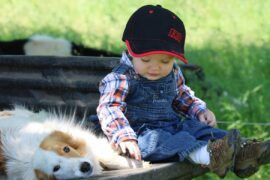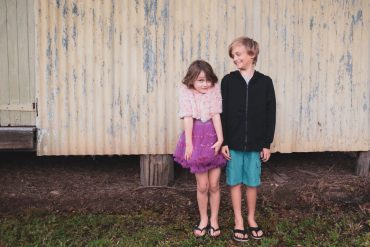By Nelle Myrica Donaldson
“There’s no raspberries allowed in this fighting game!” my three-year-old calls out. “There’s no tickling in snow-fighting!” giggles the six-year-old. We pelt each other with soft, white bed pillows (“snowballs”). I tackle them without tickling OR blowing raspberries on their belly buttons. They scramble, squirm, and breathing hard, continue to heap the covers onto the opposite side of the bed. (They are hoarding the snow, but I choose not to call them out on their tactics).
Here are the rules of any roughhousing game I’m willing to play:
- Try not to hurt anyone (including yourself).
- Respect all additional rules and boundaries that are announced as the game progresses.
- When (inevitably) some frenetic misstep befalls the play, pause to show concern for injured or offended parties and apologize generously.
Lawrence J. Cohen’s books, The Opposite of Worry: The Playful Parenting Approach to Childhood Anxieties and Fears, and The Art of Roughhousing: Good Old-Fashioned Horseplay and Why Every Kid Needs It (co-authored by Dr. Anthony T. DeBenedet), advocate roughhouse play to safely exercise power struggles, while providing an opportunity for connection between parent and child. Also stating that “play – especially active physical play, like roughhousing – makes kids smart, emotionally intelligent, lovable and likable, ethical, physically fit, and joyful.”
What?! Wow! Could pillow fighting be the cure for all that ails our kids? Could so-called horseplay be corrective of preschool histrionics and incessant fart-talk? Well…umbrella solutions are almost always too good to be true, but here’s a closer look:
Smart: having or showing a quick-witted intelligence; clever; bright; able.
Brain-derived neurotrophic factor (BDNF) is a neuron growth stimulating chemical that is released during physical play. Those adorable baby lions in the Sahara ARE practicing hunting skills and displays of physical dominance toward their future success, but they are also pollinating their brains – specifically the cortex and hippocampus regions, with BDNF. These brain regions in mammals are responsible for learning, language, logic, and memory: the functions that make us “smart.”
Emotionally intelligent: able to recognize one’s own and other people’s emotions, to discern and label feelings appropriately, and to use emotional information to guide thinking and behavior; emotional awareness; social savvy.
This is where the rules come in. Roughhousing involves reading and regulating emotions. Anticipating another person’s “fight” moves means studying where that person is coming from; designing play tactics that comply with the rules of the game means regulating personal behavior in the heat of the moment. Players learn to intuit the ethic of reciprocity and how to challenge another person without posing threat, cruelty, or endangerment. All that reining-in amid chaos amounts to the practice of regaining self-control, which is emotionally empowering.
Players learn to intuit the ethic of reciprocity and how to challenge another person without posing threat, cruelty, or endangerment.
Likable: easy to like; pleasant; friendly; good-natured.
Physical ease with another person is a declaration of trust and friendship. This comes from an understanding of the difference between well-intentioned playfulness and antagonistic hostility. Negotiation and leadership are also involved in “the rules of the game”: there needs to be respect, agreement, and commitment all around; and some sort of turn-taking is involved in equitable roughhousing. All these practices prepare children to be dynamic and trustworthy friends and partners.
See next page for the rest…











